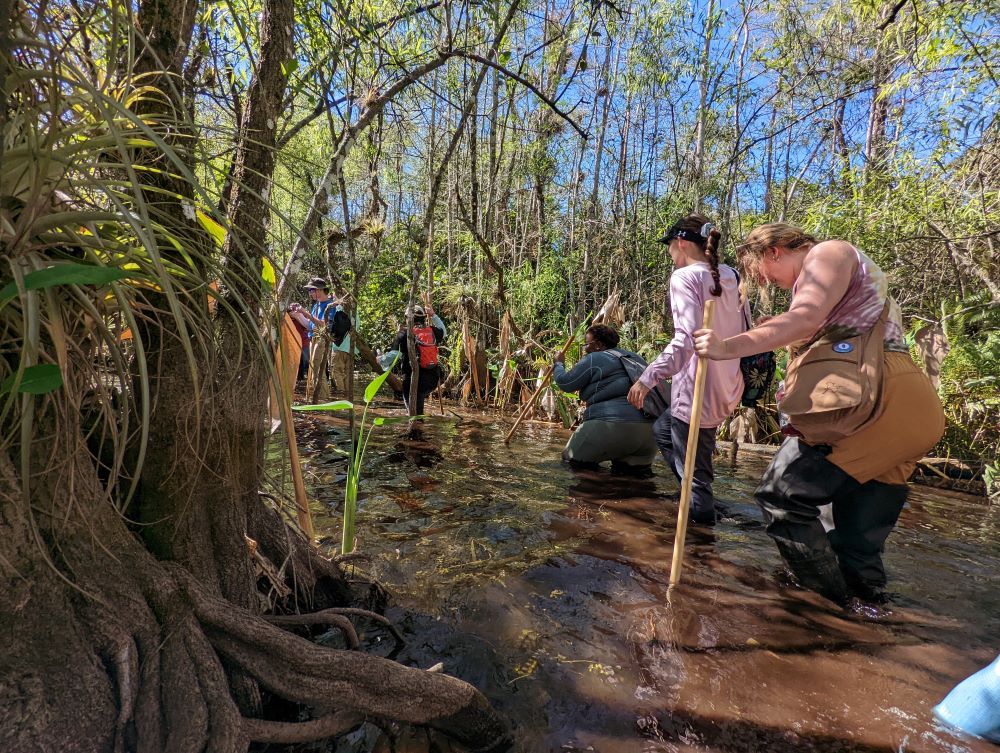
Everglades Trip Brings Students into World of Wetlands Restoration
They camped beneath the stars, slugged through mud, slept in close proximity to some gators and returned home with a clearer understanding of the important role wetlands play in today’s conservation efforts.
A group of nearly 30 College of Coastal Georgia students benefited recently from the real-life learning experiences the college aims to offer. During a trip with their professors to the Everglades National Park in Florida, the students learned about wetlands restoration and the kinds of research being done to preserve these ecosystems.
The trip allowed students to see and touch what they’d so far only discussed in a classroom.

“Leading up to it we had talked a lot about the process of wetland restoration and wetland ecosystems generally,” said Emily Tarsa, assistant professor of environmental science and wetland ecology at CCGA who went on the trip.
“We had tied in some of the work that’s being done down there, but the Everglades generally is the Mecca of wetlands restoration. They’ve spent billions of dollars trying to restore that system.”
The three-day trip included a guide-led walk through the Everglades — when the students recall being in muddy waters so high it reached their thighs — as well as a trip to Sweetwater Wetlands Park, which is an important space for stormwater collection.
“They collect all of the stormwater from the city of Gainesville and clean that water through these natural wetlands before it moves on to Paynes Prairie,“ Tarsa said.
She asked a colleague at the University of Florida to share her and her students’ research in wetland restoration.
“There’s a whole world of research that goes on, and a lot of it is larger scale than what we do here,” Tarsa said. “To see how students could move into that in graduate school or beyond is a cool thing to observe.”
The group camped each night, and for some — like Soraya Byrdsong, a senior — it was the first time.
“It was certainly something,” she said, laughing, “to set up a camp for the first time in the dark with just several flashlights. It was very interesting. I think I only lasted a night in a tent, and then I slept in (Tarsa’s) car.”
Seniors Ashley Haymans and Carlie Blackburn chose to sleep in hammocks their first night and had a peaceful rest under a sky filled with stars.
Tarsa wanted her students to see wetlands restoration efforts in person and learn how the college class could fit into their larger professional aspirations.
“For me, looking back on my experiences as an undergrad, it was those field experiences where I was totally pushed out of my comfort zone doing crazy, off-the-wall things that really stuck with me and made me want to pursue the career that I’m in now,” Tarsa said. “One of my personal goals was to give students these opportunities to be in a totally unique system, walking through a wetland.”
Several students said the trip most definitely pushed them out of their comfort zones and into an adventure they otherwise would not have taken.
“It’s not stuff we would have ever gone out and done,” said Sage Christman, a junior. “No part of you would have been like I’m going to just drive down to Sweetwater Wetlands for the day.”
The trip was so impactful for Christman that she returned to campus and decided to add a new major.
“I’m a biological science major, and this was more of an environmental science class,” she said. “So I came back from the trip, and I’m now double majoring in biology and environmental science.”


Wetlands restoration fits into larger conservation efforts that the generation in school now will play a significant role in continuing. Christman said she hopes to see a greater shift in the collective thinking on how the Earth’s resources are protected.
“I think we always see the Earth as something we have to take from, like it just gives us things, but in return we should be living with it and giving back to it and coexisting instead of just taking what we want,” she said.
Byrdsong said her generation has a lot of work to do to deal with the consequences of previous generations’ actions.
“Our generation I think has a lot more passion about it because we have a lot more access to resources and connections that previous generations weren’t able to make, so we want to fix this because we want to continue living and thriving in a happy and healthy world,” she said. “You need a lot of these conservation efforts in order to do that.”
The United Nations declared 2020-2030 to be the “decade of restoration,” Tarsa said, which is meant to include a massive push to undo environmental damage previously inflicted.
“There’s this big awareness and recognition that in this time that we’re living in, with the climate changing, things are very dire,” she said.
A lot of conservation work focused on sustaining ecosystems relies on restoring what’s been degraded, she said.
“Wetlands especially are one of the most productive and important systems out there, but they’re being lost and degraded at the most rapid pace,” she said. “A class like this — wetlands restoration — ties in the urgent need globally to have restoration of our ecosystems with the focus on this particular ecosystem.”
Haymans said the class and the trip to the Everglades helped her better understand how important this conservation work will be.
“Before taking this class, I knew wetlands were around and I knew a lot of our other systems were being degraded and lost,” she said. “But I didn’t realize exactly how much or how many wetlands there were, especially around here in Georgia, that were completely almost gone. It’s eye opening.”
Republished with the permission of The Brunswick News. Originally published in The Brunswick News.